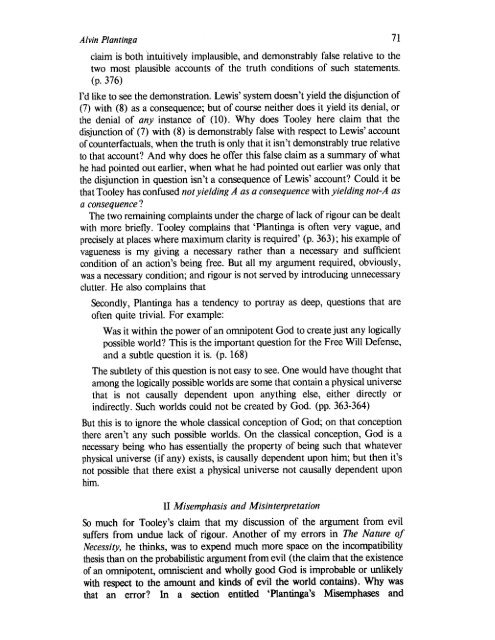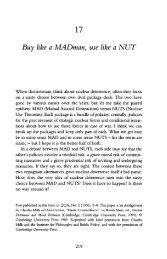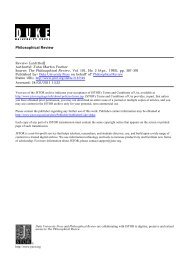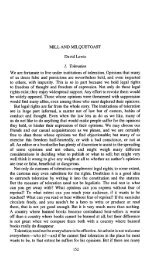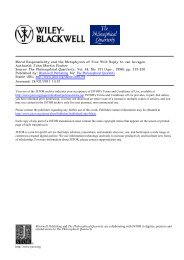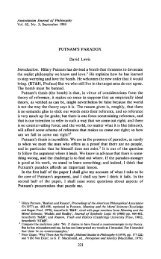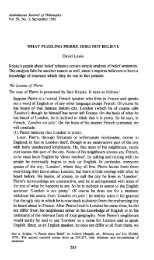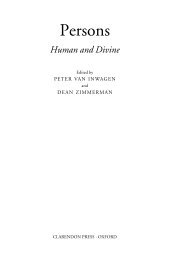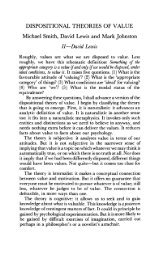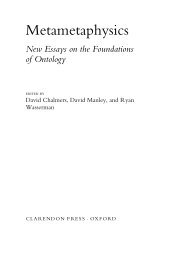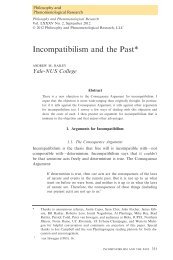Tooley and Evil - Andrew M. Bailey
Tooley and Evil - Andrew M. Bailey
Tooley and Evil - Andrew M. Bailey
- No tags were found...
You also want an ePaper? Increase the reach of your titles
YUMPU automatically turns print PDFs into web optimized ePapers that Google loves.
Downloaded by [University of Notre Dame] at 11:51 14 April 2012Alvin Plantinga 71claim is both intuitively implausible, <strong>and</strong> demonstrably false relative to thetwo most plausible accounts of the truth conditions of such statements.(p. 376)I'd like to see the demonstration. Lewis' system doesn't yield the disjunction of(7) with (8) as a consequence; but of course neither does it yield its denial, orthe denial of any instance of (10). Why does <strong>Tooley</strong> here claim that thedisjunction of (7) with (8) is demonstrably false with respect to Lewis' accountof counterfactuals, when the truth is only that it isn't demonstrably true relativeto that account? And why does he offer this false claim as a summary of whathe had pointed out earlier, when what he had pointed out earlier was only thatthe disjunction in question isn't a consequence of Lewis' account? Could it bethat <strong>Tooley</strong> has confused not yielding A as a consequence with yielding not-A asa consequence ?The two remaining complaints under the charge of lack of rigour can be dealtwith more briefly. <strong>Tooley</strong> complains that 'Plantinga is often very vague, <strong>and</strong>precisely at places where maximum clarity is required' (p. 363); his example ofvagueness is my giving a necessary rather than a necessary <strong>and</strong> sufficientcondition of an action's being free. But all my argument required, obviously,was a necessary condition; <strong>and</strong> rigour is not served by introducing unnecessaryclutter. He also complains thatSecondly, Plantinga has a tendency to portray as deep, questions that areoften quite trivial. For example:Was it within the power of an omnipotent God to create just any logicallypossible world? This is the important question for the Free Will Defense,<strong>and</strong> a subtle question it is. (p. 168)The subtlety of this question is not easy to see. One would have thought thatamong the logically possible worlds are some that contain a physical universethat is not causally dependent upon anything else, either directly orindirectly. Such worlds could not be created by God. (pp. 363-364)But this is to ignore the whole classical conception of God; on that conceptionthere aren't any such possible worlds. On the classical conception, God is anecessary being who has essentially the property of being such that whateverphysical universe (if any) exists, is causally dependent upon him; but then it'snot possible that there exist a physical universe not causally dependent uponhim.II Misemphasis <strong>and</strong> MisinterpretationSo much for <strong>Tooley</strong>'s claim that my discussion of the argument from evilsuffers from undue lack of rigour. Another of my errors in The Nature ofNecessity, he thinks, was to expend much more space on the incompatibilitythesis than on the probabilistic argument from evil (the claim that the existenceof an omnipotent, omniscient <strong>and</strong> wholly good God is improbable or unlikelywith respect to the amount <strong>and</strong> kinds of evil the world contains). Why wasthat an error? In a section entitled 'Plantinga's Misemphases <strong>and</strong>


